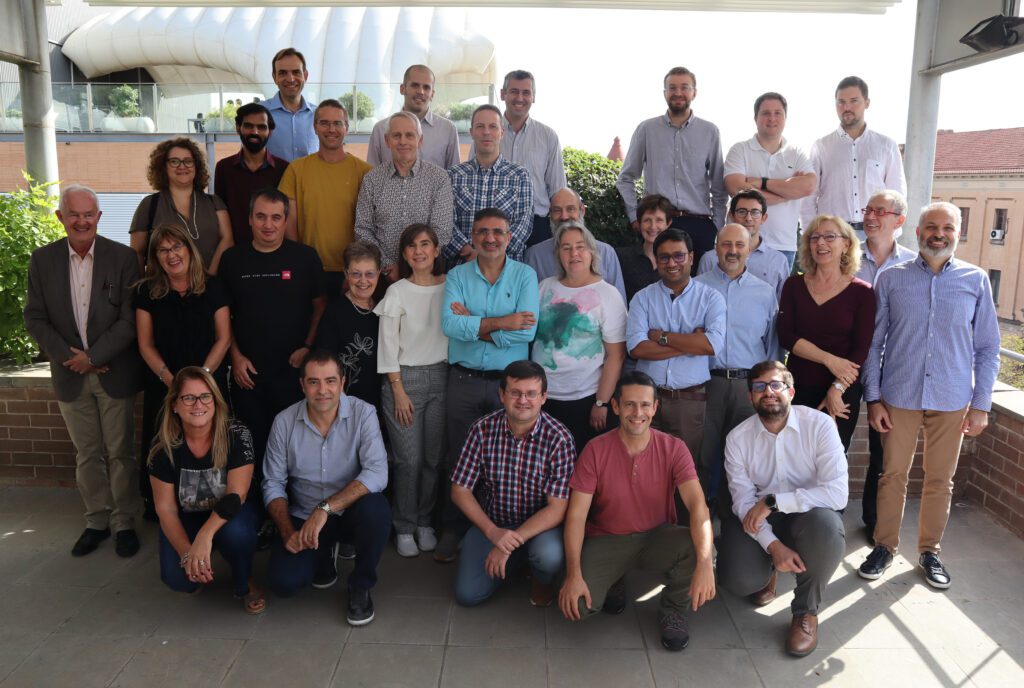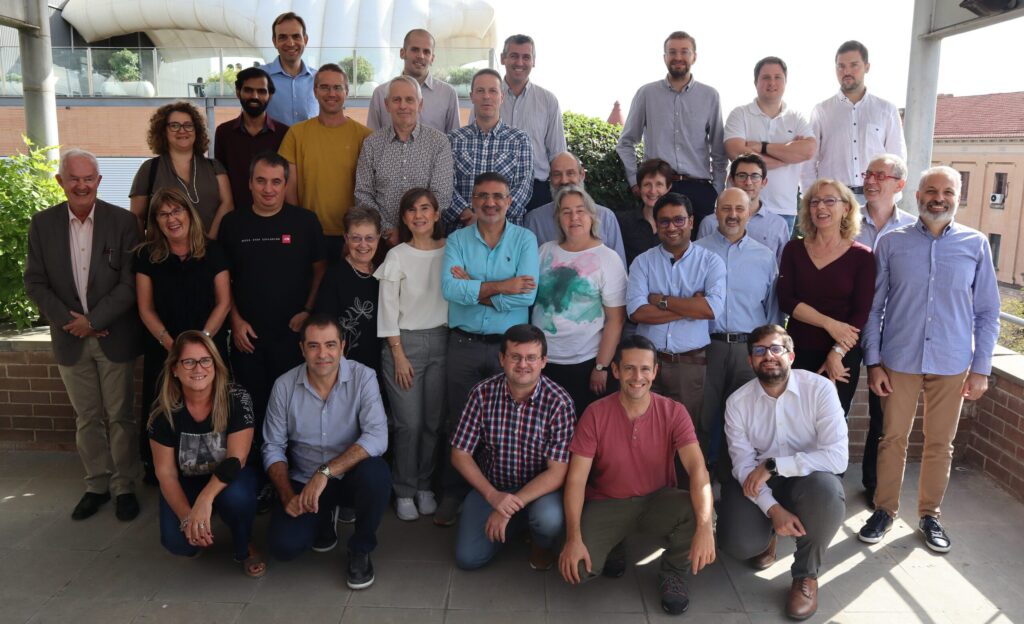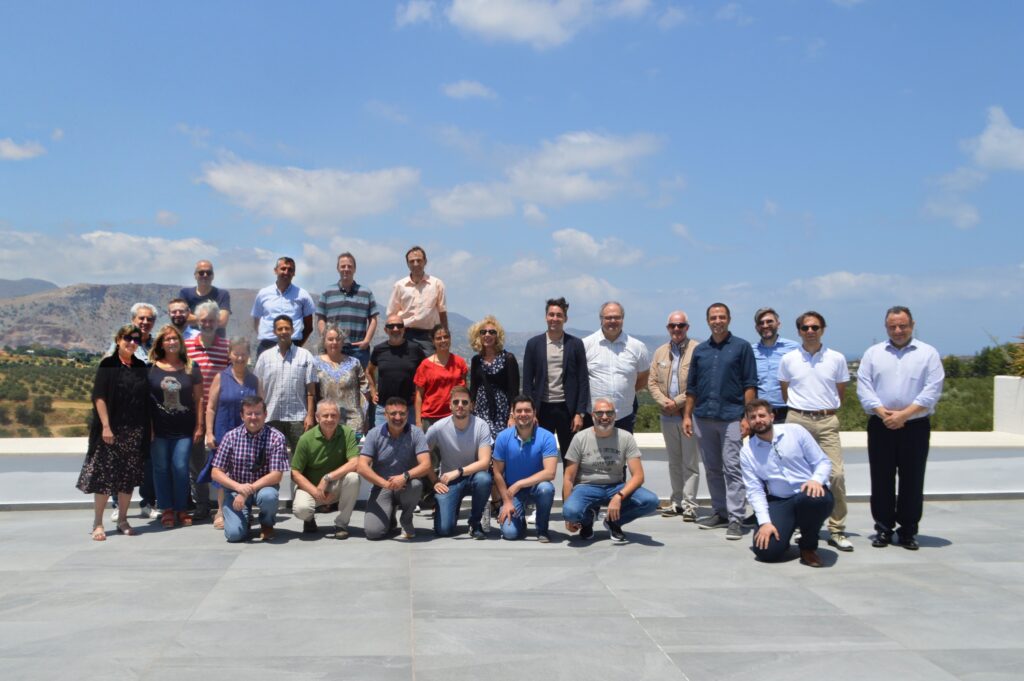2nd NextGEM meeting in Barcelona 25-26 October 2022
NextGEM is a 48-month Horizon Europe project officially launched on 1st July 2022 with a total budget of 7.56 M€ EU funding under the “Exposure to electromagnetic fields (EMF) and health” call.
NextGEM held its 2nd plenary meeting and the 1st technical workshop on 25-26 of October 2022, at the International Centre for Numerical Methods in Engineering (CIMNE) premises in Barcelona, Spain.

The meeting, which was co-organized by CIMNE and the Institute of Materials Science of Barcelona (ICMAB, CISC), gathered more than 30 attendees from the 20 European consortium partners, which joined both in-person and via teleconference.
The objective of the meeting was to present work achieved until the present point. Additionally, the technical workshop, which followed the general section of the plenary, focused on the technical aspects of the project. At the end of the two-day event, next steps were decided, as well as the coordination of efforts in internal communication and research planning.
NextGEM vision
NextGEM’s vision is to ensure EU citizens’ healthy living and a safer working environment when employing existing and future Radio Frequency Electromagnetic Field (EMF)-based telecommunication technologies. This will be accomplished by generating relevant knowledge that identifies appropriate control measures of EMF exposure in the residential, public, and occupational settings, trusted by the general public, while also staying in-line with regulations and laws issued by public authorities.
To achieve the above, NextGEM will provide a framework for generating health-relevant scientific knowledge and data in new scenarios of exposure to EMF, in multiple frequency bands. The project also aims to develop and validate tools for evidence-based risk assessment. NextGEM will also create the NextGEM Innovation and Knowledge Hub (NIKH) for EMF and Health, offering a standardised way for European regulatory authorities and the scientific community to store and assess project outcomes and insights into how EMF exposures affect health.
NextGEM Consortium
NextGEM’s consortium consists of 20 organisations located in 10 European countries (i.e. Greece, Italy, Spain, Cyprus, Germany, Belgium, Netherlands, Sweden, Switzerland and Israel). Moreover, the Institute of Computer Science of FORTH (ICS-FORTH) is the overall coordinator of the project.
Each NextGEM partner provides unique expertise, essential for the implementation of the project. Partner accumulated knowledge will empower NextGEM to include measurements and modelling of EMF sources, investigate of potential health effects by experimental human studies, investigate possible causal links between EMF exposure level and duration on potential health effects, perform risk assessment on studies and results and develop an innovation and knowledge hub to be used by scientists, relevant authorities, while also enhancing citizen awareness.
2nd Project meeting and 1st Technical workshop
During the meeting in Barcelona, active work packages leaders presented the work performed and their next steps. Dr. Nikolaos Petroulakis (ICS-FORTH), the coordinator of the project, presented the overall progress of the project, both in project management and technical aspects.
Prof. Fulvio Schettino (University of Cassino) presented the work done in the identification of the requirements analysis, specifications and design, while Dr. Marco Spirito (TU Delft) and Dr. Olga Zeni (CNR IREA) presented the upcoming work on the innovative model and sensor-based technologies for exposure monitoring and assessment of human studies and experimental approaches for assessing biological and health-related effects of EMF, respectively.
Dr. Andreas Gavrielides (eBOS) presented the work performed on project dissemination and communication activities, the next steps in contributions to the CLUE-H cluster of all EMF health projects mandated by the European Commission, as well as policy contributions and exploitation plans for the NextGEM Innovation and Knowledge Hub.
During the technical workshop, four sessions initiated vivid dialogues and sparked numerous enlightening conversations in the areas of:
- RF-EMF exposure modelling and measurements, led by The Hague University of Applied Sciences (THUAS).
- Experimentation studies and biological effects, led by Sciensano (SC).
- Causal links between EMF and potential health effects, led by Sciproof International (SPi).
- NextGEM Innovation & Knowledge HUB (NIKH), led by Intracom Telecom (ICOM).
All participants had the opportunity to provide their insights, opinions and ideas, paving a ground of common direction that will be followed towards achieving the objectives of the project.
NextGEM’s next project meeting will take place in Spring 2023 in Naples, Italy, and will be hosted by the Consiglio Nazionale delle Ricerche (CNR) – Istituto per il rilevamento elettromagnetico dell’ambiente.
More Information and Contact
NextGEM includes an ambitious communication and dissemination programme, with activities meant to maximise the impact of its’ generated results, thus increasing general awareness on the subject. An informative and functional project website, as well as presence in multiple social media platforms are continuously updated to provide full insight to the inner workings and progress of NextGEM.
2nd NextGEM meeting in Barcelona 25-26 October 2022 Read More »






